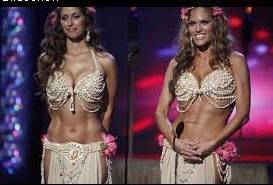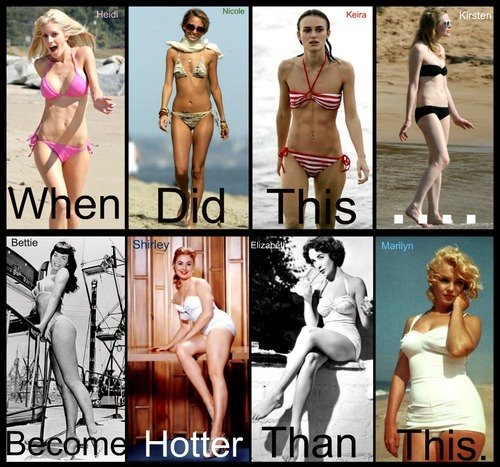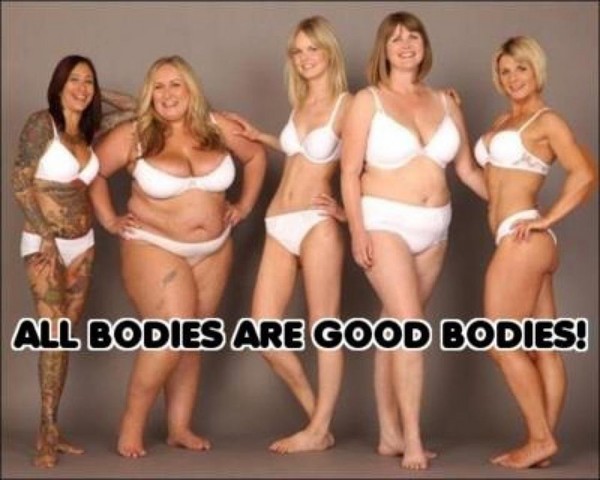
At one point on Facebook, a bunch of people I knew joined Facebook groups here and there with titles like "CURVY GIRLS ARE BETTER THAN SKINNY GIRLS" and "BETTER TO BE BIG THAN A BAG OF BONES," etc. Obviously I support people doing their best to be as healthy as they can, and in our society it is very disappointing and scary to see so many women starving themselves to get to some body standard that they they've been shamed into thinking is ideal. I also think it's ridiculous and depressing that so many heavy people get mocked and treated like they're less than human just because they're overweight. (Not to mention so many people assume that if you're big you must eat too much or that you're not healthy, when actually plenty of bigger people have healthier eating habits than skinny people.) BUT.
There is never a reason to tell someone she's not a real woman because she isn't curvy.
Pride in your body, your sexuality, your nationality, whatever you want to be proud of, is possible without putting down people who are different from you. I am disappointed that the Facebook group "Curvy girls are better than skinny girls" had almost 2 million members when I checked, while "Curvy girls are hot" only had just over five thousand. I understand that to some extent it's kind of a backlash thing, and that because most of the people who try to make fat people second class citizens ARE skinny people they are looked at as the enemy. But this is not the answer. Any more than enacting laws and policies to give men lower salaries than women would be the proper expression of feminism.
Examples.
There were a pair of belly dancers on the reality show America's Got Talent. Their names were Kaya and Sadie. During their interviews, they kept banging on about how they're "REAL women with REAL curves" and acting like their "curvy" bodies should be upheld as the pinnacle of femininity, and kept kind of mixing that into their message. Meanwhile one of their competition acts, AscenDance, featured a woman who was very tall, muscular, not very curvy, and flat-chested. I believe she is as "real" and as much of a "woman" as they are, thanks. I really don't like that while they're celebrating their femininity and good body image, they are also very clearly implying that there is one definition of a real woman and that is a gal with meat on her bones.
C'MON, STOP THE HATIN' Y'ALL! Ahem.
I do often see women using the word "curvy" sort of like a euphemism for "heavy," and I think that's very positive. So it kind of surprised me that the belly dancers took that angle when describing themselves. Usually when you hear "curvy women are AWESOME," you're hearing it from people who have heard otherwise to their faces, and are trying to create a positive image for people like them. While these ladies are definitely curvy in the obvious sense of the word, I don't think you could ever argue that either of them has been dissed for being heavy or told they shouldn't be dancers because of their weight. In fact, I know a lot of people who would call them skinny. Seriously, look.


Then there was this:

I much prefer messages like this:

And one of the worst things about the body shaming--besides, well, it being body shaming--is that it suggests there is an objective standard of what a woman is. Some women don't have curves at all. Some women are trans and actually have what some people would traditionally think of as masculine bodies; did you ever think about who you're calling "not a REAL woman" if you insist that a body needs to look a certain way or else a woman's femininity is called into question? It just isn't a helpful statement.
Celebrate yourself and be proud of yourself and strive to have and keep the body that you're most comfortable with. Don't attack someone else's body to make a case for yours being superior.
Any comments left here are PUBLIC. If you are not comfortable with that, mail me directly.
Comments from others:
Amb3r: Argh. This issue has been the source of so many rants for me. Not only is this "curvy is better" mentality awful because of the way it sets up one body type against another, but also it is founded on sexualization. Why is it again that women should be worried about how "hot" their bodies and about making sure it is the "right" hotness? Since when does "hotness" affect my ability to do sports, my ability to think, my ability to have a conversation? It is like a fight over who deserves the right to be objectified.... disturbing.
swankivy: I tried to mail Amb3r back but my e-mail bounced. This is what I wanted to say:
Of course it could be argued that some people want to be seen sexually, though I'd hope they'd stop short of objectification. It's definitely a question of "I acknowledge your worth in terms of how attracted to you I am" rather than assigning the value to the women intrinsically, though.
I have no desire to be slobbered over or sexualized myself, but I know some women are made uncomfortable by the idea of not seeming attractive, so some women are hurt by it when they're told their bodies are "disgusting" (read: not sexually attractive). No matter what, though, what we look like should never figure into that.
Will: @Amb3r you're right, absolutely...but let's face it, if being hot wasn't important in any way, this wouldn't be an issue to begin with. Sexuality, no matter how you look at it is important, the point isn't that "no one needs to be sexy" it's that "everyone can be sexy" But again, you are right, a girl doesn't have to be sexy to be valued as a person, but I think as humans, we are immediately compelled to judge another person's sexual traits, or "sexualize" them as you put it. Let me pose a question to you; Do YOU enjoy feeling sexy? probably you do...and so does everyone else.
swankivy: Actually some people don't enjoy feeling sexy--I'm a good example of a case in point--so blanket statements like "so does everyone else" don't necessarily work. I like being basically aesthetically attractive. I don't want to be sexually attractive and am not hoping for that response. Some people feel it's important, and no one should be excluded categorically by these crappy attitudes or made to feel like they should be ashamed for not having the body type that appeals to the most vocal, most popular demands.
paul kriese: Women often buy inot the thin is better because men want women to be thin. A healthy woman is as attractive as any womaan. It is all in attitude not body shape. I sue Maya Angelou's Phenomenal Woman in my co-taught online course titled "the Political and Psychology of Hate" to make this point. Many women 'get it' but many men do not,
Charlie: For a long time "curvy" women were criticised and it's good that now people of different shapes and sizes can feel more confident about themselves. The thing I object to is that it seems to be done by criticising thin people. I have always been very slim, I'd have to eat about 10 king size chocolate bars a day for a month just to gain a pound but that is not my fault so why do people hate me for that? I see all the pictures on the internet of people who have similar figures to me being branded as "disgusting" and "not a real woman" which makes me feel awful about myself. And yes, a lot of people do seem to want to be seen sexually, they want everyone to find them attractive but surely you can look good and feel good in yourself without it necessarily having to mean how sexy you are? I love to see the variety in peoples dress sense and different races, hair colours, heights etc, it makes things interesting and all people are like unique works of art. Why can't sizes and shape be seen in the same way?
Nick: Lately I have been reading a lot of stuff on the website about atheism and I pretty much agree.Well, I did agree with most of the article, the picture of the different
Nick: Sorry, I accidentally hit the send feed back. Any way I agree with most of what you say, but in the picture, the women second to the left appeared to be pretty overweight . Although I don't advocate bullying( I myself have been overweight), being overweight can have health risks, such as heart disease, diabetes, etc. I believe that although we shouldn't bully people, we should not accept obesity. We need to fight. Nearly 33% of adults are obese, and obesity kills nearly as much as smoking. Accepting obesity is not the solution. There are some things we should not accept. This is the problem I have with fat acceptance. It ignores the enormous risks associated with overweight people.
swankivy: Nick,
I absolutely disagree with your fearmongering about obesity and your statement that we "should not accept" being overweight.
Obesity does not "kill nearly as much as smoking," and it's actually beliefs like yours that contribute to fat people being unable to get adequate medical care because people are "concerned" about their weight before even considering other issues, and insist that losing weight (specifically losing weight, not necessarily eating better) will improve their condition.
In addition, you and I don't have any business telling other people how to handle their health issues, including conditions that may or may not interact with their weight. I don't give anyone unsolicited advice about wearing sunblock or drinking enough water or getting enough exercise or taking care of their eyesight or making sure they go to the dentist twice a year. Fat people are not a special exception to this. I don't know what you think you're helping by claiming you "won't accept" obesity, but no one is telling you you have to become obese or that you have to appreciate any individual person's aesthetic. Don't contribute to bullying or the poisonous myths that blame fat for diseases that don't have any sort of cause and effect relationship with being fat, and don't kid yourself that this is actually about health since typically thinner people aren't subjected to commentary on their food or exercise choices even if they eat a lot of junk food and don't take care of themselves.
It's not up to you to create a hostile situation where only certain kinds of body types that many people associate with unhealthiness are attacked for their life choices. "Fat acceptance" movements are also generally about mental health and self esteem, not what people outside those movements often represent them as ("glorification of obesity," "encouraging just giving up on yourself," etc.). People should be able to feel good at any size they are and not be harassed by people who pretend they're just concerned about your health. It's also been proven that being shamed for your body is less likely, not more likely, to contribute to adoption of healthy habits.
Some of the same health habits that cause health problems like heart disease and diabetes can also contribute to weight gain, yes. But both of those diseases happen to people who are not overweight, and being overweight does not "cause" them to get those diseases, so it doesn't help to attack the person's weight or claim it's a sign of unhealthiness that needs to be treated with social hostility and shaming. I know you said you don't advocate bullying, but if you really don't, then you need to really look at what you're advocating here and think about what "not accepting" obesity means to you, and whether it just translates to criticizing fat bodies that you assume are indicative of poor health, thereby dubbing yourself some kind of health hero who only waves flags over one supposed symptom.
If you don't criticize other choices that are associated with health problems, like how consistently alcohol consumption is presented as a normal part of adult life, or how people don't do certain self-checking examinations to monitor for cancer, then you have an awfully specific interest in people's health only if you can see it in the form of their larger body, and you're willing to make assumptions about it while skipping all the actual medical examinations that would determine whether the person is healthy--not that ANY of that is your business.
As for the science, to paraphrase one of the researchers I am acquainted with who knows how bogus "but fat people are unhealthy!" actually is:
Show me one meta-analysis of randomized and controlled weight loss experiments published in a reputable journal showing that *clinically significant* weight losses (I.e. not just 3lbs) can be maintained by the majority of people for longer than 3 years.
Show me one meta analysis of randomized and controlled experiments showing that weight loss improves health in a *clinically significant way* (i.e. not just a three point change in blood pressure) where those effects are independent of the benefits of fruit/vegetable consumption and exercise, last for longer than 6 months, and occur without serious negative health consequences like depression and disordered eating.
Show me some epidemiological studies demonstrating a negative correlation between weight and health that adequately control for confounds like underlying health conditions (PCOS etc), socio-economic status, experiences of weight-based discrimination, history of dieting and weight cycling, and especially experiences of medical discrimination (e.g., avoidance of doctors, dismissal of symptoms, withholding care until weight loss occurs).
Because that is just the start of the reasonable burden of scientific proof needed to claim that fatness causes health problems and that weight loss is cures health problems.
(For the record, studies like these are not out there, because there are no studies that show it's weight specifically that causes these problems--which makes insistence upon attacking the shape of someone's body and blaming it for the health problems awfully suspicious. And since there are tons of fat people who eat and exercise better than some people who are slim, it's not as simple as you think, though of course I'm also not saying there is no relationship between food intake/exercise and body size. It's just not the only way to evaluate someone's health--it's not even particularly accurate.)
[This paraphrase is from Big Fat Science. http://bigfatscience.tumblr.com/post/144279927055/my-best-friend-is-a-professional-researcher-she ]